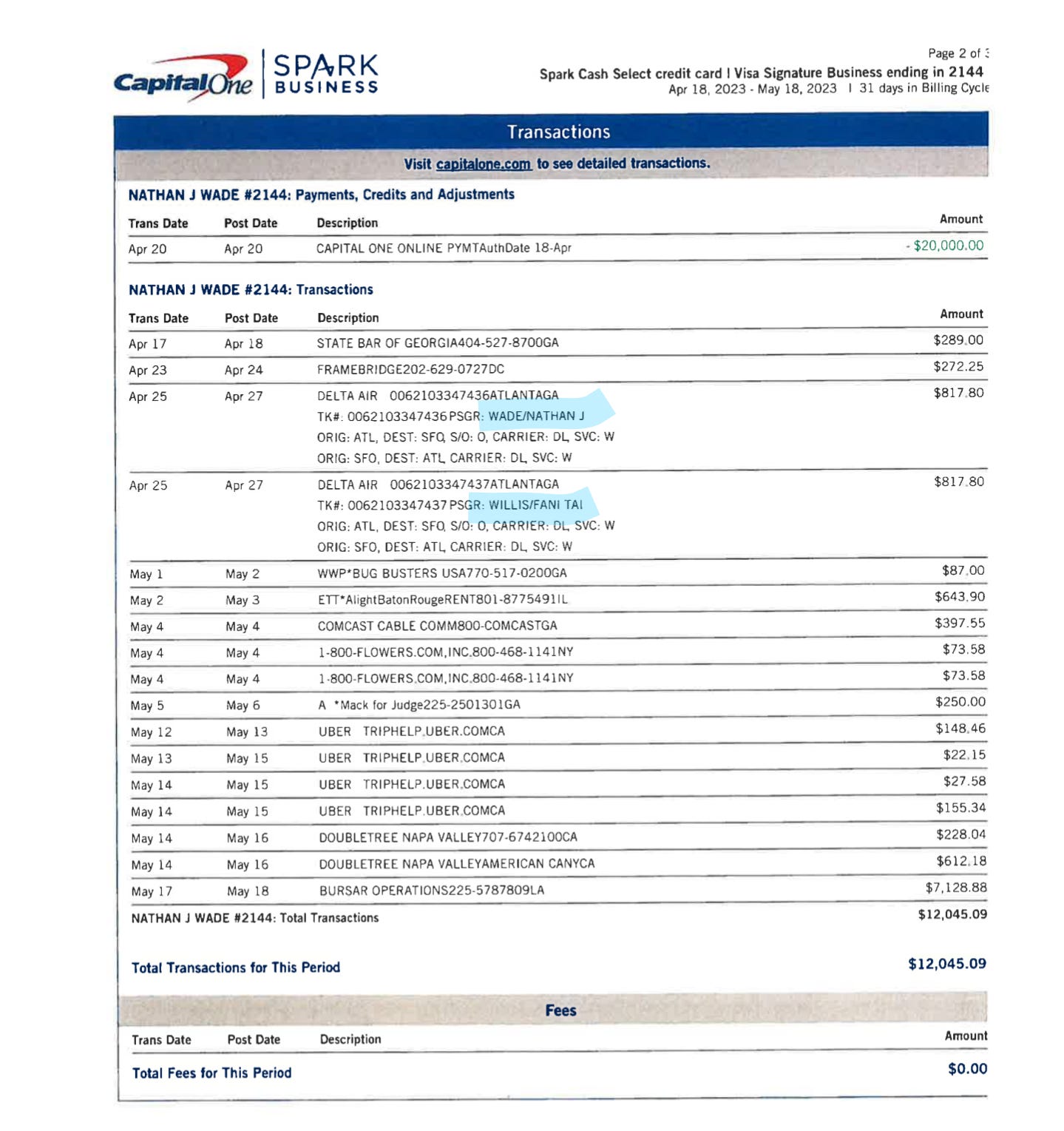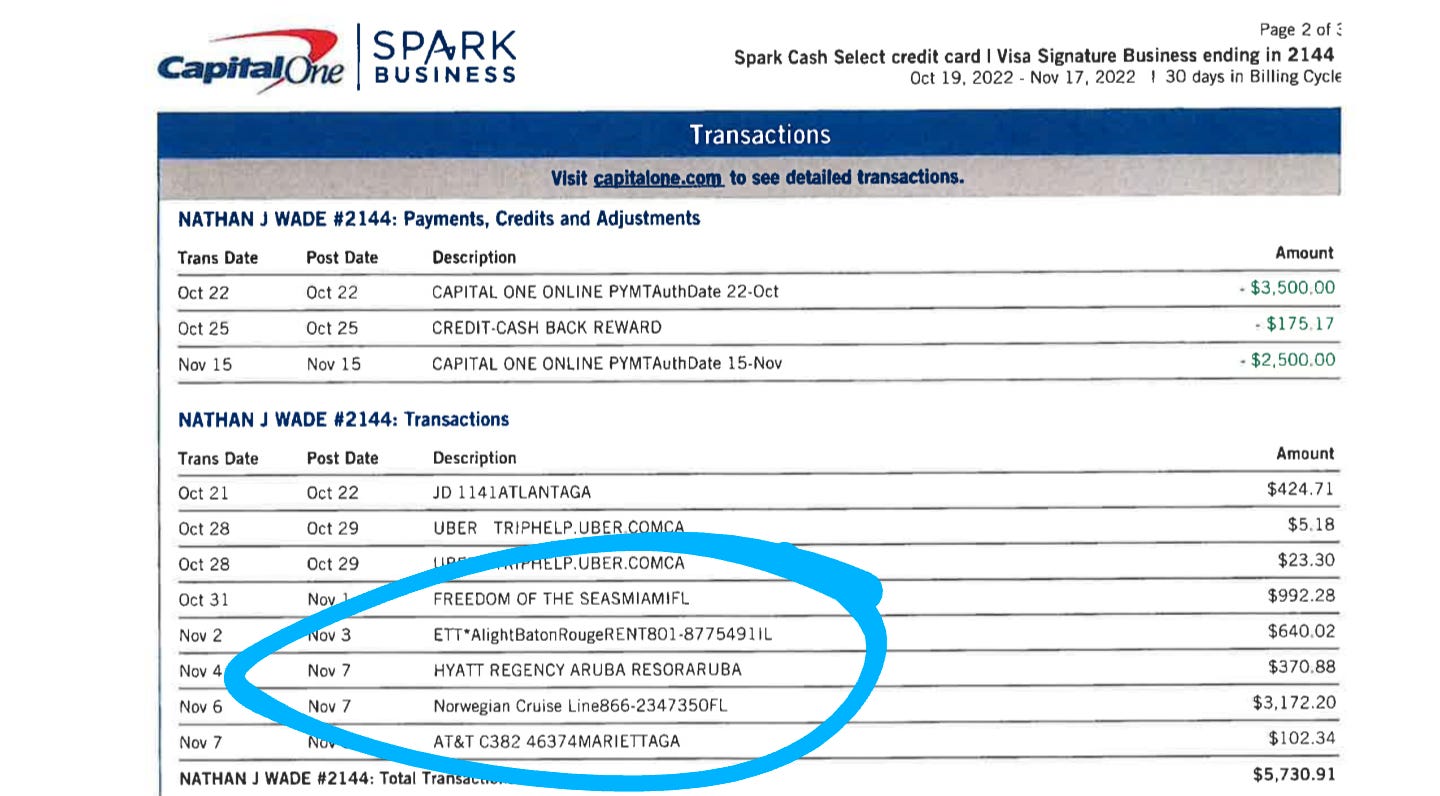Fani Willis, the Fulton County District attorney bringing the much ballyhooed RICO case against Trump, is imploding with an ethical scandal.
A hearing will take place in Georgia next month over accusations that Willis and Nathan Wade, her lead prosecutor on the county’s election-interference case against Donald Trump, had an improper relationship and mishandled taxpayer funds. Specifically, Willis hired Wade as special prosecutor while dating him, paid him nearly $700,000, and received vacations in return.
The hearing is scheduled for February 15, according to an order from Superior Court Judge Scott McAfee. The judge gave Willis until February 2 to respond to the allegations, which were first reported in a legal filing from one of Trump’s co-defendants, former campaign aide Mike Roman.
Lawyers for Roman called for Willis and prosecutor Nathan Wade to be removed from the case and for the charges against Roman to be dismissed “on the grounds that the district attorney and the special prosecutor have been engaged in an improper, clandestine personal relationship during the pendency of this case, which has resulted in the special prosecutor, and, in turn, the district attorney, profiting significantly from this prosecution at the expense of the taxpayers.”
Neither Willis nor Wade has denied these allegations, which says a lot. After days of criticism, Willis chose to respond by giving a speech at the Bethel AME Church in Atlanta, in which she decried the expectation that black women be perfect, and compared herself to Martin Luther King Jr. She claimed that Wade’s race, and not his limited criminal litigation experience, was the basis of public skepticism, and noted that people had not scrutinized the other two special prosecutors, who are white, about their credentials.
But as Andrew Fleischman observes, this is easily explained and has nothing to do with the other prosecutors’ skin color. The fact of the matter is that they’re infinitely more qualified than Wade. Anna Cross is a former DeKalb County assistant district attorney who, in addition to handling dozens of felony appeals, has argued important motions for Fulton County. And John Floyd is widely considered Georgia’s leading expert on state RICO prosecutions and helped draft the law. These two billed a combined $116,000—less than a quarter of Wade’s total. According to an agreement obtained by the Daily Caller, Floyd appears to have been paid about $100 less per hour than Wade despite the latter being far less experienced.
You know it’s bad when even the rabidly anti-Trump Daily Beast admits the optics on this make both these paramours look horrible. For starters, Wade filed papers to divorce his wife the day after Fani Willis hired him. Then there’s the inescapable truth that Willis made choices throughout her prosecution that seem, in retrospect, calculated to require him. Take the special grand jury, for instance. Despite these being “quite rare in Georgia,” Fulton County announced that it would use a special grand jury whose purpose would not be to indict anyone, but to gather evidence—this, even though “the makings of a hard-to-challenge criminal conviction were already there.” But instead, Wade was broadly used during those special grand jury proceedings, and he earned hundreds of thousands of dollars helping to conduct them.

Notably, the legal filing from Mike Roman’s lawyers was very specific, alleging that Willis and Wade “have traveled personally together to such places as Napa Valley, Florida, and the Caribbean and the special prosecutor has purchased tickets for both of them to travel on both the Norwegian and Royal Caribbean cruise lines.” And that’s because there are receipts. We know this because of Wade’s divorce proceedings with his soon to be ex-wife, Joycelyn Wade, who has sought to depose Willis as part of the divorce case, alleging that Willis has had an ongoing affair with her husband and that Willis would have knowledge about Nathan Wade’s actions and the marriage itself that would help the divorce court divide marital assets and calculate spousal support.1 And so attorneys for Joycelyn Wade dropped a bomb last Friday, in which credit card statements were disclosed revealing that Nathan Wade did indeed purchase trips for Willis. See for example this screenshot showing plane tickets to San Francisco, along with some of the cruises they allegedly went on:
The romantic relationship between Willis and Wade matters a good deal in determining how The State of Georgia v. Donald J. Trump, et al. proceeds. Legal analyst Jonathan Turley notes that the Georgia courts established in Whitworth v. State that a district attorney should be disqualified when there is a personal interest in the defendant’s conviction. In this instance, Willis has staked much of her career on this case and appointed a prosecutor with whom she is romantically involved.2 She obviously has an interest in furthering her lover’s career and benefits, and Trump, the other defendants, and the public are entitled to disinterested prosecutors.
Moreover, to ensure public confidence in the integrity of the county, the Fulton County Code of Laws § 2-66 bars conflicts of interest “in fact and in appearance.” It states that no “officer or employee shall, by his or her conduct, give reasonable basis for the impression that any person can improperly influence him or her, or unduly enjoy his or her favor, in the performance of any official acts or actions.” To say nothing of the prohibitions on the receipt of gifts due to one’s office—like receiving luxurious vacations paid for by a subordinate you’re enriching on the taxpayer dime. It’s also worth mentioning that prosecutors in the State of Georgia are required to take the following oath: “I do swear that I will faithfully and impartially and without fear, favor, or affection discharge my duties as district attorney and will take only my lawful compensation. So help me God.”
There’s an indisputable conflict of interest at play here. Andrew Fleischman points out that when a Georgia judge was found having sex with a public defender outside the courthouse, the courts did not hesitate to find that this required new trials for the accused, even if it might have arguably been to their benefit. Just as here, the guilt or innocence of those accused was irrelevant. The conflict of interest required a new trial. Only the most TDS-afflicted, DEI-deranged morons will argue that Willis and Wade shouldn’t recuse themselves, and that their continuation in the case wouldn’t undermine the prosecution and is still in the public interest.
It’s important to understand, however, that their recusal won’t erase the threat to Trump in Fulton County. Removal of the prosecutors for unethical conduct will not entail the dismissal of what’s being portrayed as an otherwise valid criminal case, and the underlying allegations against the former president will remain the same. As mentioned at the beginning of this post, a hearing will be held next month to look over the truth of these allegations. If they are found to be true, it is likely that the judge will disqualify Willis, which, under Georgia law, will require disqualifying her entire office. The case will then go to the Prosecuting Attorneys’ Council of Georgia, which will decide who the case can go on to next. And even if things go smoothly, it’s unlikely that Trump will be tried before the November election, which works to his advantage.
But this is where things get interesting, because a new prosecutor might not support this controversial RICO case. As Turley underscores, “Every prosecutor is under a personal obligation to determine whether there is an ethical basis to prosecute. Some prosecutors would likely balk at the tenuous connections used to sweep Trump into this grand conspiracy theory, which many critics believe Willis has pursued for political purposes.” And it really is a ridiculously grand conspiracy theory—so much so that an outside prosecutor might not share Willis’s priorities for prosecution.
Willis sought a protective order to prevent her deposition and gave implied threats that Joycelyn Wade was obstructing the DA’s investigation of Trump. Willis, however, never denied the affair.
This is also a scandal because Willis broke the rules governing the appointment of a special prosecutor to benefit her lover. According to the filing from Mike Roman’s attorneys, she misrepresented how she would use Fulton County funds to clear the COVID-19 legal backlog, and instead used them to appoint the special prosecutor without proper approval.











I'm personally shocked that a law-stretching bureaucrat best known for stretching the law for personal gain was caught stretching the law for personal gain!
I've seen wives get back at their husbands for cheating, but I don't think I have ever seen this level of payback.